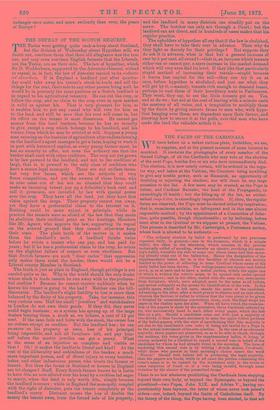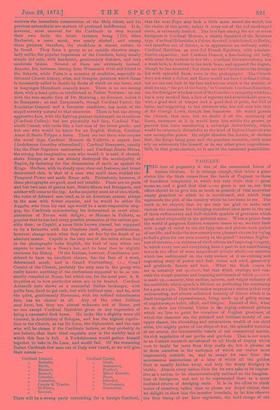THE FACES OF THE CARDINALS.
WE have before us a rather curious plate, forbidden, we see, to copyists, and at the present moment of some interest to mankind. It contains the photographs of every member of the Sacred College, of all the Cardinals who may vote at the election of the next Pope, besides five or six who have intermediately died. This election, it is now nearly certain, will be ordered in the regu- lar way, and taken at the Vatican, the Conclave being unwilling to give any hostile power, such as Bismarck, an opportunity of doubting or rejecting the election, nor will there be any large accession to the list. A few more may be created, as the Pope is better, and Cardinal Barnabo, the head of the Propaganda, in exceedingly ill health ; but the filling-up of the list, an ecclesi- astical coup d'e'tat, is exceedingly improbable. If, then, the regular forms are observed, the Pope must be elected either by inspiration, that is, unanimous acclaim, an infrequent and in this ease almost impossible method ; by the appointment of a Committee of Selec- tion, quite possible, though objectionable ; or by balloting, before some altar in the Quirinal or we suppose at present, the Vatican. This process is described by Mr. Cartwright, a Protestant author, whose book is allowed to be authentic :— " The ordinary election by ballot is performed by two processes repeated daily, in general,—one in the forenoon, which is a simple ballot; the other in the afternoon, which consists in the process technically called of acceding, whereby an elector, revoking his morn- ing's ballot, transfers his vote to some one whose name had that morn- ing already come out of the ballot-box. Hence the designation of the supplementary ballot, for in it the faculties of electors are strictly limited to the power of adhering to some Cardinal whose name at the early ballot has been drawn. The voting-papers are square and folded down, so as at each end to have a sealed portion, within the upper one of which is written the voter's name, to be opened only under special circumstances ; and in the other, sealed with the same seal, HOMO motto from Scripture, which, once adopted, must be the same at all ballots, and serves ordinarily as the means for identification of the vote. In the middle space, which is left open, stands the name of the candidate. Advancing to the altar, after a short prayer in silence, and an oath aloud, wherein the Saviour is called to witness that the vote about to be given is dictated by conscientious eonvictions alone, each Cardinal drops his paper in the chalice upon the altar. When all have voted, the examina- tion of the papers is made by the serntators, three Cardinals selected by lot, who successively hand to each other every paper, which the last files on a pin. Should a candidate come out with just a majority of two-thirds, it then becomes necessary to open the upper folded portions of the ballot-papers, with the view of ascertaining that this majority is not due to the candidate's own vote ; it being not lawful for a Pope to be the actual instrument of his own creation. In the case of no adequate majority, these papers are preserved, so as to be able to check, through the mottoes, the votes given in the supplementary ballot, it being, of course, unlawful for a Cardinal to repeat a second vote in behalf of the candidate for whom he had already voted in the morning. The form of tendering thie second vote is by writing Accedo domino Cardinali,' while those who persist in their morning's choice insert the word
Should both ballots fail in producing the legal majority, then the papers are burnt, while in all cases the portion containing the voter's name is to be opened by the scrntators only in the event of some suspicion of fraud or of a vote being invalid, through some violation by the elector of the prescribed forma."
There is no law whatever prohibiting the Cardinals from stepping beyond their own body, or beyond the Episcopate, or beyond the priesthood—two Popes, John XIX. and Adrian V., having un- questionably been laymen, the latter of whom never took priest's orders—nor, indeed, beyond the limits of Catholicism itself. By the theory of the thing, the Pope having been elected, in that act
receives the immediate consecration of the Holy Ghost, and his previous antecedents are matters of profound indifference. It is, however, most unusual for the Cardinals to step beyond their own body, the latest instance being 1758, when Barberini, a mere monk, was nearly elected ; and among these pictures, therefore, the candidate is almost certain to be found. They form a group to an outside observer singu- larly unlike the popular impression of the Conclave, being usually simple old men, with handsome, gentlemanly features, and very moderate brains. Several of them are extremely learned. Asquini, for, instance, having been Wiseman's rival and friend in the Schools, while Petra is a monster of erudition, especially in Oriental Church history, rites, and liturgies, points on which Rome is incessantly called to decide by flocks of which no one hears, and in languages Mezzofanti scarcely knew. There is no one among them with a head quite so intellectual as Father Newman ; no one with the true ascetic face of Dr. Manning ; no dreamer, unless it be Bonaparte ; no real Torquemada, though Cardinal Patrizi, the Inquisitor-General and a favourite candidate, has much of the stupid severity natural to that character. There is but one strong aggressive face, with the fighting peasant underneath its steadiness (Cardinal Cullen) ; but one physically bad face, Cardinal Van- nicelli Casoni, who looks like a turf man of the lower grade ; and but one who would be taken for an English Bishop, Cardinal Amat di Santo Filippo e Sorso. There are but three who surpass the usual type, Cardinal Monaco de Valletta, a superb face (Archdeacon Grantley etherealised) ; Cardinal Bonaparte, exactly like the First Napoleon seminarised ; and Cardinal Riario Sforza, the strong, but imaginative man who would, it is said, if elected, shake Europe, as he has already destroyed the municipality of Naples, by declaring for the democracies of earth, as against its Kings. His face, with its steady eyes, clear-cut features, and broad determined chin, is that of a man who could have wielded the Temporal Power and made Rome safe. Protestants, however, if these photographs are good, need not tremble. There are no poets and but two men of genius here, Riario Sforza and Bonaparte, and neither will come to the top. As the majority must be of two-thirds, the votes of defeated men tend, as in an American caucus, always to the man with fewest enemies, and he would be either De Angelis, who from his vast age would be a most respectable stop- gap, the Cardinals remembering his determined or cruel admi- nistration of Fermo with delight ; or Monaco la Valletta, so popular that he has had every possible promotion at the earliest pos- sible time ; or Capalti, a name little known abroad, but supposed to be a favourite with the Conclave itself, whose predilections, however, change much when they are set free by the death of an absolute master. Capalti is the only one of the series whose face in the photographs looks English, the kind of man whom one expects to meet in a Dean's hat, and to hear that he slightly overawes his Bishop. Of the Italians, however, Panebianco, con- sidered to have an excellent chance, has the face of a stern, determined monk, and is Grand Penitentiary, i.e., Grand Casuist of the Church, probably the only man in the group who really knows anything of the confessions supposed to be so con- stantly revealed at Rome, but which are, for the most part, A. B. inquiries as to how particular cases are to be treated. Cardinal Antonelli here shows as a successful Italian innkeeper, with polite face, fixed to get cash, but with brilliant eyes ; and he, with the quiet, gentlemanly Borromeo, with his refined schoolmaster face, has no chance at all. Any of the other Italians may have, but they are almost unknown out of Rome, and no one except Cardinal Morichini gives us any impression of being a successful dark horse. He looks like a slightly worn old General, is Archbishop of Bologna, and has the highest reputa- tion in the Church, as has De Luca, the diplomatist, and the man who will be chosen if the Cardinals believe, as they probably do not believe, that their chief requisite now is the worldly tact of which this face is full. A Yorkshireman would gather himself together to take in De Luca, and would fail. Of the remaining Italian Cardinals few men out of Italy ever heard, so we will give their names :-
Cardinal Asquini,
31 Barnabo,
7, Barth, Bizzarri, Berardi, 2, Caterini, !, Consolini,
Carafa di Traetto, Di Pietro,
3) Sacconi,
Cardinal Casoni, „ Giudi,
/f Antonucci,
Ferrieri.
Milesi Ferretti,
1) Pecci, Silvestri, Trevisanato, Grassellini.
There will be a strong party contending for a foreign Cardinal, that the next Pope may look a little more round the world, but the choice of this party, unless it steps out of the red-stockinged circle, is extremely limited. The best face among the six or seven foreigners is Cardinal Moreno, a stately Spaniard of the Ximenes type. Cardinal Hohenlohe, a Prince, devoted, it is believed, to Berlin, and therefore out of favour, is in appearance an ordinary noble ; Cardinal Matthieu, an over-fed French dignitary, with adminis- trative capacities ; and Cardinal Donnet, a fine-looking old lady, with some deep sadness in her life ; Cardinal Schwartzenburg has a weak look, is Austrian to the back-bone, and opposed the dogma, though he has recanted ; but there are two Cardinals in the foreign list with splendid faces, even in the photographs. The Church does not want a Julius, and Rome would not bear Cardinal Cullen, but no one can look in his face and not see which is the warrior, or shall we say," the pet of the fancy," in Conclave. Cardinal Rauscher, too, the foreigner who has most of the Conclave's sympathy with him, has a very marked face, a face of separate and unmistakable power, with a good deal of temper and a good deal of pride, but full of brain, and suggesting to the observer who has not seen him that of Sir George Lewis, though less humorous. He would govern the Church, that man, but we doubt if all the machinery of Rome, enormous as it is, would keep him within the groove, or prevent him from manifesting a sovereign individuality, which would be extremely distasteful to the kind of Italian Clericals who now monopolise power. He might dissolve the Jesuits, or declare that, the Kings being gone and the populace unstable, earth must rely on aristocrats like himself, or do any other great imprudence. Still, in that great election, he is one of the imminent possibilities.



































 Previous page
Previous page